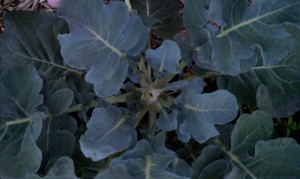 This isn’t a post about books but about broccoli. At least it begins with broccoli. If you’re a gardener on the East Coast of the United States, you’re likely to be harvesting some broccoli around now.
This isn’t a post about books but about broccoli. At least it begins with broccoli. If you’re a gardener on the East Coast of the United States, you’re likely to be harvesting some broccoli around now.
We had a good, early harvest from our community-garden plot this year (no thanks to the produce thieves who helped themselves to a couple of heads, but that’s another story). This past weekend, I was going to pull up the broccoli that had done producing and plant some warm-weather lovers–tomatoes, peppers. As I was about to uproot one of the plants slated for destruction, I spotted a row of tiny green ovals attached by hairlike stalks to one of the stems. Later I discovered they’re probably lacewing eggs, laid on individual stalks to prevent the larvae from cannibalizing each other when they hatch.
The closer I looked, the more lives I saw: a spider the size of a grain of rice, who’d created a sticky trap that looked like a drop of water at the base of a leaf; a preying mantis about an inch long, who held perfectly still and watched me. I’d done with the plants; the rest of the garden’s visitors and residents hadn’t.
So much for the master plan. I left the plants, and their inhabitants, in peace, un-uprooted.
Call it a Merwin moment. My husband recently wrote about W.S. Merwin, who came to Washington to read at the Library of Congress as part of his poet-laureate duties. Mark was telling me about the driving principle of Merwin’s life: a recognition that everything living is alive together–at the same time, in the same moment, now, here. If you let it, that sense of here-now-together has the power to alter your sense of what it means to exist in the world. We are, truly, in this together–and “we” encompass multitudes.
In my garden plot, the tomatoes and peppers are now tucked here and there, not quite in their ideal spots, and at some point I will probably need to annex the space the broccoli occupies. When I do, though, I will make sure to disrupt, dislocate, or otherwise incommode as few of us as I can.
Gardening, I’ve concluded, is a life-affirming activity that’s also a disruptive technology. That’s a term one hears a lot these days in conversations about what digital innovations are doing to traditional publishing. My Merwin moment showed me that it applies in the resolutely undigital sphere of the garden, too. In order to grow or raise almost anything–broccoli, beets, beans, beef–you’re probably going to dislodge, displace, or destroy something else. There are more and less generous and observant ways to do this, of course. But it’s vital, I think, to keep an eye on what to a human may seem like to be disruptions so tiny they don’t matter at all. They do matter if you’re a praying mantis an inch long. And it matters to me that my garden be a place not just to grow produce but to see the rest of the world up close and be reminded that it’s larger than any of us.

